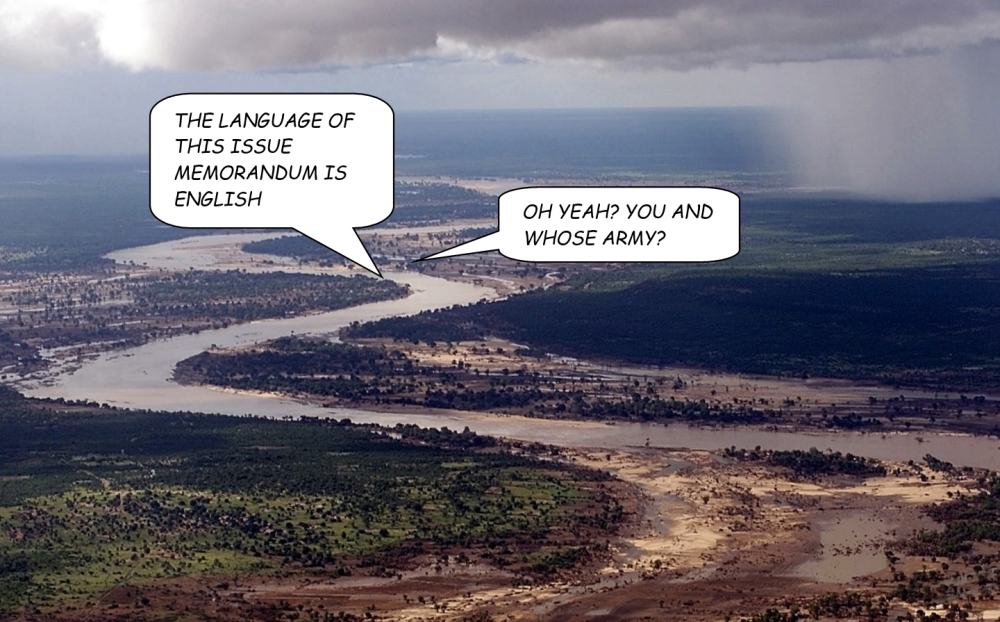The language of the Issue Memorandum is English: Difference between revisions
Amwelladmin (talk | contribs) No edit summary Tags: Mobile edit Mobile web edit |
Amwelladmin (talk | contribs) No edit summary Tags: Mobile edit Mobile web edit |
||
| (One intermediate revision by the same user not shown) | |||
| Line 19: | Line 19: | ||
If so, what then? | If so, what then? | ||
We thought of printing the statement in Esperanto, like so: | We thought of printing the statement in that ''lingua franca'' of the [[Libtard|enlightened liberal elite]], Esperanto, like so: | ||
{{Quote|La lingvo de ĉi tiu prospekto estas la angla}} | {{Quote|La lingvo de ĉi tiu prospekto estas la angla}} | ||
Now this has its own issues, not least of which the corollary paradox: this disclosure ''isn’t'' in English, and the benighted non-Esperanto-conversant English reader — God forbid there should be any — for whom it is intended will be none the wiser. | |||
A conundrum | How is she then meant to know the prospectus is in English? A conundrum indeed. | ||
{{sa}} | {{sa}} | ||
Latest revision as of 19:06, 24 February 2023
|
The Law and Lore of Repackaging
|
Spotted, in the wild, in an offering memorandum:
“The language of the Issue Memorandum is English.”
We know not which magic circle foundry forged the fever dream whence this disclosure came, but it must have been one of them: only a spirit broken by years of relentless beasting could be quite so abstruse.
Look, we can giggle at those well-meaning Belgian jobsworths, hell-bent, with their KIIDs, on demystifying all the manifold arcana of capital markets prospectusry — but not even the haughtiest Eurocrat could be that pedantic.[1]
Could one, over the weft and warp of a two-hundred and seventy pages prospectus, really be in any doubt as to what language it was written in? Could a reader really carry on thinking, “well, this looks like English, but there remains an outside chance it is Bulgarian”?
Or is it an admission? There are lengthy stretches of any securities offering which, for all the sense they make to a reasonably educated Brit, may as well be in Swahili. Is this rider there to assure the reader no, she is not seeing things, this really is intended, with a straight face, as informational content, in English, for a reasonably seasoned prospective investor?
There is, in any case, a paradox at work here. Even so simple a sentence as this — from our learned friends, you will hardly find a simpler one — requires a reader to bring her cultural baggage in from the hall. One of those contains the language she brings to her interpretative task.
Assume it is English. She may crinkle her brow, and think this a statement of the painfully obvious, but will move on, no better equipped to navigate the forthcoming syntactical rapids.
But say it is, indeed, Bulgarian, Serbo-Croat, or Panamanian — or some as yet unrecorded means of communication between the communities along the Limpopo. There’s a slim — very slim, to be sure, but existent — chance the text string, “The language of the Issue Memorandum is English” carries some meaning there, too. It is most unlikely to be the same one as English. It may even start a fight.
If so, what then?
We thought of printing the statement in that lingua franca of the enlightened liberal elite, Esperanto, like so:
La lingvo de ĉi tiu prospekto estas la angla
Now this has its own issues, not least of which the corollary paradox: this disclosure isn’t in English, and the benighted non-Esperanto-conversant English reader — God forbid there should be any — for whom it is intended will be none the wiser.
How is she then meant to know the prospectus is in English? A conundrum indeed.
See also
References
- ↑ A glance at the Prospectus Directive confirms this: Art 27(2) requires offer documents to be drawn up in an official language but, Europeans presumably having the intelligence to at least recognise their own mother tongue, one need not disclose what that language is.
